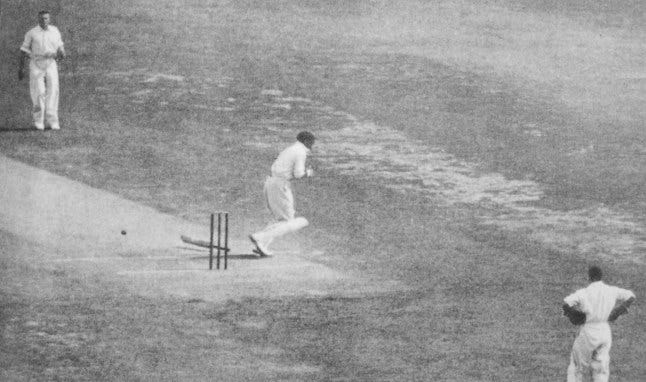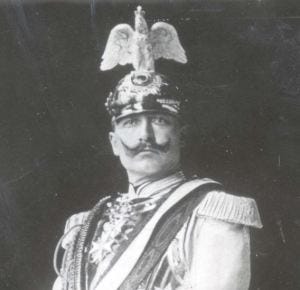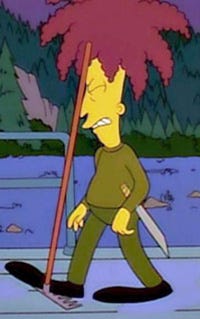Michael Clarke and his merry unchanged-throughout-the-series men have crushed England -- 5-0 in the Tests and up 3-1 in the one-dayers as of this writing -- and it is not too early for the Australian to envision a return to some kind of leadership, if not the dominance of the Steve Waugh era. This Aussie team is an aging one, but there is something about it that suggests the whole is greater than the sum of the parts.

This most recent peak follows a trough whose marker, in my view, isn't the retirements of the all-time greats at the end of the 2006-07 Ashes. Rather the buoy marking the place where Australian cricket subsided the last time has the name of Peter Roebuck emblazoned on it. For it is Roebuck who called for Australian captain Ricky Ponting's head on a platter in a famous headline. "Arrogant Ponting must be fired" was the leader. From a member of the one-eyed Australian media, this was an unprecedented volley.
***
Roebuck was the odd man out in the Australian media. For starters, he wasn't Australian. He was a bookish and quirky Cambridge-educated Englishman, a very English Englishman (as in mad dogs and Englishmen). He moved to Australia in the '90s after he retired from first-class cricket -- shades of Larwood -- and occupied a unique position in the media there, with his orthogonal takes on every aspect of Australian cricket.
Someone will write a compelling pyscho-biography of Roebuck one day, perhaps of the standard of David Foot's treatment of the equally fascinating Wally Hammond (a far greater cricketer, but Roebuck's peer in tortured psychological complexity). Roebuck is far more interesting as a human being than the dozens of twentysomething cricketers who publish execrable ghost-written memoirs every year. His story does not end well -- in a bizarre turn of events, the man who wrote the foreword for David Frith’s somber book on cricket suicides leaped to his own death, cornered by law enforcement in South Africa in an episode that is still a mystery.
But this is not about Roebuck qua Roebuck. Rather it is about what happened after he unloaded his musket at Ponting. Looking back to those few days in early January, 2008, it now seems evident that Roebuck led the average Australian cricket fan to become, briefly, "a man who, for the first time in his life, with horror-stricken eyes, looked upon the world as it really was." That quote has to do with a Prussian general dying mid-fouette while clad in a pink tutu -- I promise I didn't make that up.
What got Roebuck into this frenzy?
***
The Australian cricket team has a leitmotif that runs throughout its 145 year history in Test cricket, and is best encapsulated in the phrase "we play hard but fair". Often this has taken the form of being intemperate abusers on the field, all to be glossed over by the parallel tradition of "aw, look, it's only on the field, mate, coz after a hard day's play we head over to the opponent's changing room and down a few beers. Mate. Aw. Beer. Hardbutfair".
Steve Waugh, my nominee for the greatest of all Australian cricket captains, called it "mental disintegration", but there is a line. Some Australian cricketers haven't just crossed that line -- they don't know where the line *is*. Exhibit A is the current coach and former Test cricketer, Darren Lehmann -- how quickly we've forgotten that the lovable and hardbutfair "Boof" was banned by the ICC for racial abuse. Aw, mate.
On January 6, 2008, during the second Test of the series between India and Australia, on-field banter at the Sydney Cricket Ground turned into something far nastier. I won’t re-hash the episode; some contemporaneous views can be found here and here. The truth of the matter will never be known, given all the obfuscations, personal agendas and the fact that India-vs-Australia is a major moneymaker for both national cricket boards.

Bill Woodfull, an Australian captain on the receiving end of English mental and physical disintegration during the most famous cricket series in the history of the sport, said at the height of the Bodyline controversy that "only one team out there is playing cricket". Anil Kumble, the Indian captain and a better-read sportsman than most, said something similar at the end of the 2008 Sydney Test, and captured the high ground in a way that was especially wounding to an Australian cricketer's, and indeed an Aussie cricket fan's, self-image.
***
Roebuck always looked out for the underdog, and against the Australians of this period every other cricket team qualified as an underdog. He fired his broadside with great authority and resonance, for the Australian cricket team were already widely perceived as bullies (although with not quite as much moral authority as Ngconde Balfour on a subject I hope to write about at some point).
Ponting and his crew were halted in their tracks, not unlike a schoolyard bully stepping on a rake and getting whacked right on the proboscis. That day something died, for a while, in Australian cricket. Ponting was never the same. The team lost its needle.
A long decline followed. They seemed, on so many occasions after, under Ponting and then under the early years of Michael Clarke's leadership, to be trying awfully hard to be nice. But that's not Australian cricket. Aussie cricket doesn't do nice well ---and the sport needs the Aussie needle and edge. Millions adore Rahul Dravid and Adam Gilchrist, as indeed they should; but cricket with just the Dravids and Gilchrists isn't cricket, it's croquet.
***
I am a huge fan of Michael Clarke's; I have felt that he's been treated unfairly by the media for not being yet another one of the boys. But he is a wonderful batsman; an exciting and innovative captain; and articulate and thoughtful in his public pronouncements.
You could tell, if you read Clarke's Ashes diary (on Ashes #1 of 2013, the one in England), that this was a man at the end of his emotional tether. The diary has been described as "guarded". I found it refreshingly honest, and a piercing introduction into what goes on in the mind of a national captain in perhaps the most mentally stressful of all sports.
It is clear now that Clarke's mental state near the end of 2013 had evolved to something akin to that of Allan Border in 1989. There was something Rocky-like in Clarke's verbal punch at Anderson in the first Test of Ashes #2 of 2013 (the one in Australia). "Get ready for a broken effing arm", Clarke said (followed immediately by the inevitable brouhaha in the media about role models).
The tone for the rest of the series was set by that encounter; and the battering that England received suggests that Australia might have finally consigned Roebuck's words to oblivion. There is no better evidence of the turnaround than to read Beefy's before and after columns.
***
Young David Warner continues in the great Australian cricketing tradition of irritating the heck out of everybody, down to the obligatory post facto apology that is a non-apology (Aw. Beers. Mate. Hardbutfair). It is his kind of swagger that makes Australia the true pantomime villains of Test cricket, a role that, at their best/worst, they occupy with great panache and vigor.
The big bad Aussies just might be back; they have been missed. But try staying this side of the line, boys.





